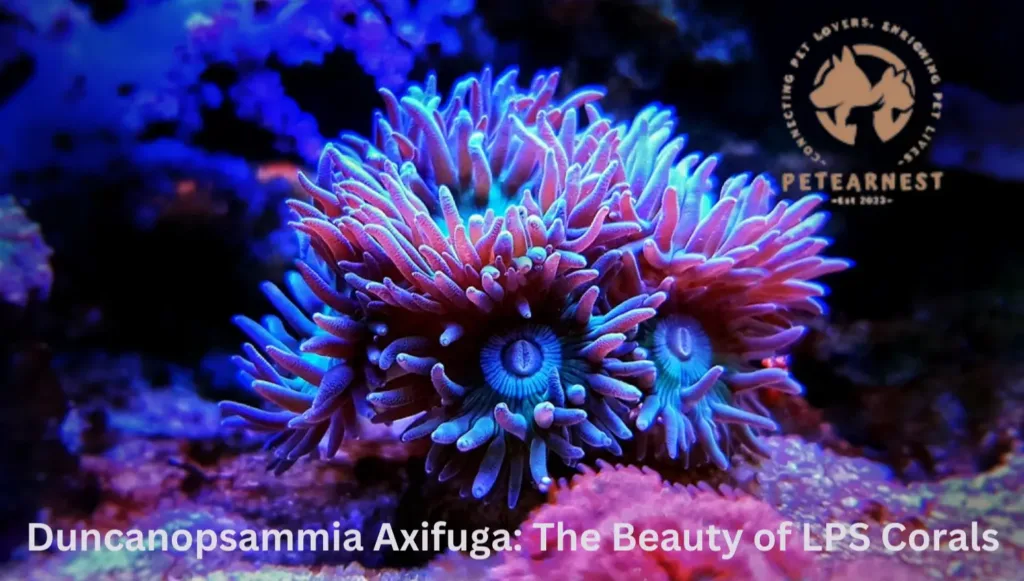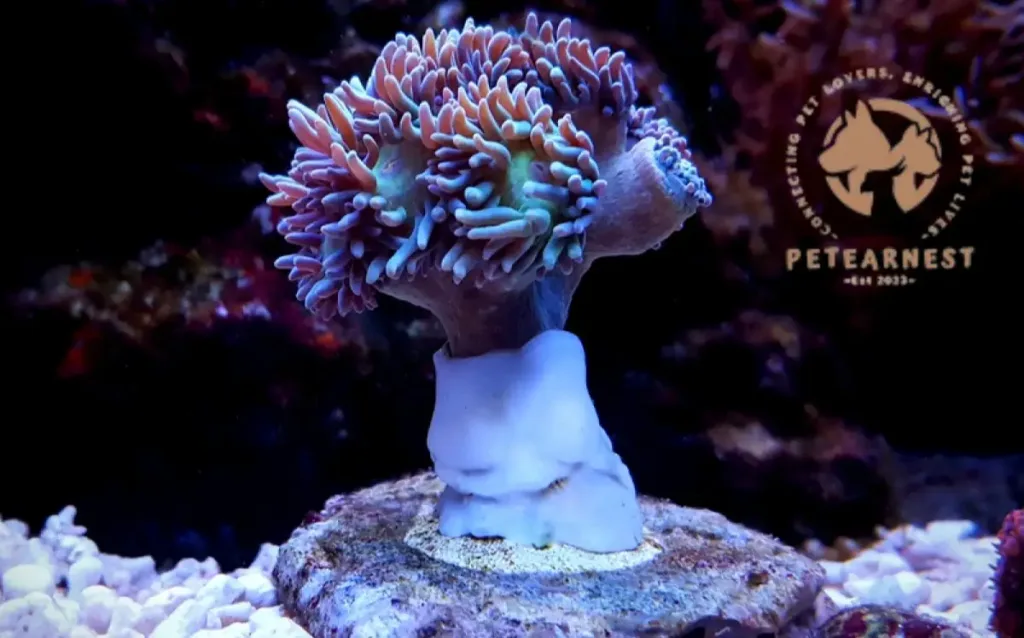
“Duncanopsammia axifuga, also known as Duncan Coral, is a stunning species of large polyp stony coral. These corals are known for their vibrant colors and unique formations, making them a popular choice among reef aquarium enthusiasts. Learn more about the care and growth of Duncanopsammia axifuga corals and bring a touch of the ocean’s beauty to your home.”
Duncan Coral, also known as Duncanopsammia axifuga, is a beautiful species of large polyp stony (LPS) coral that adds a vibrant pop of color to any reef aquarium. However, many beginner reef aquarium enthusiasts struggle with successfully growing and caring for these stunning sea creatures. That’s why we’ve put together this comprehensive guide to help you discover the 10 secrets to growing stunning Duncan Corals. With this guide, you’ll learn everything you need to know to ensure your Duncan Coral thrives and adds beauty to your aquarium for years to come.
This beginner’s guide to Duncan Coral covers everything from proper placement and water parameters to feeding and disease prevention. Our experts have used their years of experience and knowledge to share the most important tips and tricks to help you successfully grow stunning Duncan Corals. Whether you’re a seasoned reef aquarium hobbyist or just starting out, this guide will provide you with all the information you need to bring the beauty of Duncan Coral into your home.
Distinctive Traits: Understanding the Nature of Duncan Corals
Duncan Coral, also known as Duncanopsammia axifuga, is a beautiful species of large polyp stony (LPS) coral that adds a vibrant pop of color to any reef aquarium. here are some distinct characteristics:
- Large Polyp Stony (LPS) Coral: Duncan Coral is a type of LPS coral, which means it has large fleshy polyps that are attached to a calcium carbonate skeleton.
- Vibrant Colors: Duncan Corals come in a variety of colors, including green, yellow, brown, and pink. Their colors can vary depending on the amount of light and nutrients they receive.
- Unique Formations: Duncan Corals have unique formations and growth patterns, making each specimen unique and adding visual interest to your reef aquarium.
- Fast Growth: Duncan Corals are known for their fast growth and can quickly spread and colonize an area in your aquarium.
- Active Feeders: Duncan Corals are active feeders and require a steady supply of food to maintain their health and vibrant colors. They feed on tiny organisms such as zooplankton, phytoplankton, and other small organisms.
- Prefer Moderate Light: Duncan Corals prefer moderate light and will do best in aquariums that have adequate lighting and water flow.
- Resilient: Despite their delicate appearance, Duncan Corals are relatively hardy and resilient, making them a good choice for beginner reef aquarium enthusiasts.
- Sensitive to Water Quality: Duncan Corals are sensitive to changes in water quality and require consistent water parameters to maintain their health.
- Need Space: Duncan Corals need ample space to grow and should not be kept too close to other corals or rocks.
- Short Tentacles: Duncan Corals have shorter tentacles compared to other corals, making them less aggressive in nature.
Creating the Perfect Home: Essential Habitat Requirements for Duncan Corals

These Corals, like all sea creatures, have specific habitat requirements that must be met in order to thrive in your reef aquarium. These requirements include:
- Water Quality: These Corals are sensitive to changes in water quality and require consistent water parameters such as temperature, pH, and salinity levels.
- Lighting: These Corals prefer moderate light and will do best in aquariums that have adequate lighting and water flow.
- Space: These Corals need ample space to grow and should not be kept too close to other corals or rocks.
- Feeding: These Corals are active feeders and require a steady supply of food to maintain their health and vibrant colors.
- Tankmates: Although these Corals are relatively hardy and resilient, their shorter tentacles make them less aggressive than other corals. Their shorter reach is primarily for defense rather than offense. For this reason, it is recommended to keep Duncan Corals with other peaceful species of corals and fish that do not threaten their survival.
By providing the right habitat requirements, you can ensure that they will thrive and bring beauty to your reef aquarium for years to come.
10 Must-Know Tips for Optimal Duncan Coral Care
Duncan Corals are a popular choice for reef aquariums due to their vibrant colors and fast growth. However, to ensure that they thrive and flourish in their new environment, it’s important to provide them with proper care. Here are 10 tips to help you care for these Corals:
- Adequate Lighting: These Corals contain zooxanthellae symbiotic algae within their tissues that provide most of their food source. Adequate lighting is crucial to the proper functioning of these algae. Provide low to moderate full-spectrum lighting to meet their needs.
- Light Cycles: To mimic natural light cycles, consider using specialized lights that can slow-fade between light and dark cycles, including “sunrise,” “sunset,” “moonrise” and “moonset.” These cycles are essential for breeding fish or invertebrates.
- Feeding: While they primarily rely on photosynthesis from their zooxanthellae, they can benefit from an occasional feeding of small zooplankton and meaty foods like mysis. Offer a few weekly meals to boost their appearance and growth.
- Trace Elements: like other stony corals, they have specific trace element requirements to build sturdy homes. Test regularly for calcium, strontium, and other trace elements and add accordingly, based on your salt mix.
- Water Quality: Maintaining consistent water quality is crucial to their health. Regularly test water parameters such as temperature, pH, and salinity levels to ensure they remain within the recommended range.
By following these tips, you can provide them with the care they need to thrive and add color and beauty to your reef aquarium.
Avoiding Common Issues
While These are hardy and low-maintenance, there are some common issues that can arise if proper care is not taken. Here’s how to avoid these problems:
- Quarantine: Before adding any new corals to your established aquarium, it’s crucial to quarantine them in a separate system for at least four weeks. This will help prevent the spread of bacteria and viruses to your other aquatic species.
- Reputable Dealers: To ensure the health and safety of your aquarium, only buy Duncan Corals from reputable dealers who use safe propagation techniques and do not harvest from wild stocks.
By taking these precautions, you can avoid common issues and keep them thriving for years to come.
If your Duncan Coral is not thriving, despite proper care, there could be a few factors at play. Here’s what to consider:
- Water Quality: The first and foremost consideration should be the water quality in your aquarium. Check all the usual water parameters such as ammonia, nitrite, nitrate, pH, kH, gH, temperature, and salinity. Additionally, keep an eye on coral-specific parameters such as calcium, strontium, and other trace elements.
- Lighting: They require low to moderate full-spectrum lighting, so make sure they are getting adequate sunlight or artificial lighting. If your coral is not receiving enough light, its symbiotic zooxanthellae will not function properly.
- Water Flow: They need low to moderate water flow, so make sure they are not placed in an area with strong currents.
- Tank Mates: Some corals are aggressive towards their neighbors and may send chemical attacks their way. Also, some fish may try to nip at Them, so it’s crucial to keep an eye on the interactions between your coral and its tank mates.
By following these tips, you can troubleshoot any health issues It may be facing and help it thrive.
FAQs
- Are Duncan corals aggressive?
- Although Duncan Corals are relatively hardy and resilient, their shorter tentacles make them less aggressive than other corals. Their shorter reach is primarily for defense rather than offense. For this reason, it is recommended to keep Duncan Corals with other peaceful species of corals and fish that do not threaten their survival.
- What kind of coral is a Duncan?
- Duncan coral, also known as Duncanopsammia axifuga, is a species of large polyp stony (LPS) coral. It belongs to the family Dendrophylliidae and is native to the Indo-Pacific region. Duncan corals are known for their striking coloration, which can range from shades of green, blue, and purple, to yellow and orange.
- Are Duncan corals easy to keep?
- Yes, Duncan corals are generally considered to be relatively easy to keep, making them a good choice for beginner hobbyists. They are hardy and can adapt to a wide range of water parameters, provided that their basic needs for light, water quality, and nutrition are met. Duncan corals also have lower light requirements compared to other types of corals, and are not as aggressive as some other species, making them compatible with a variety of other tank mates.
- How long for Duncan coral to grow?
- The growth rate of Duncan coral can vary depending on several factors such as water quality, lighting, and nutrition. On average, it can take several months to a few years for a Duncan coral to grow. It is important to provide a stable and optimal environment for the coral to grow, including proper water flow, water chemistry, and lighting. Providing adequate nutrition and occasional feedings of small zooplankton can also help to enhance its growth. However, it is important to remember that every coral is unique and may grow at its own pace.
Conclusion
In conclusion, Duncan Corals are a great addition to any aquarium. They are low-maintenance and fast-growing, making them an ideal choice for both beginner and experienced hobbyists. With their adaptable nature, they can thrive in a variety of water conditions and tank setups, coexisting peacefully with other aquatic species. If you’re looking to add a stunning and easy-to-care-for coral to your tank, the Duncan Coral is definitely worth considering.


